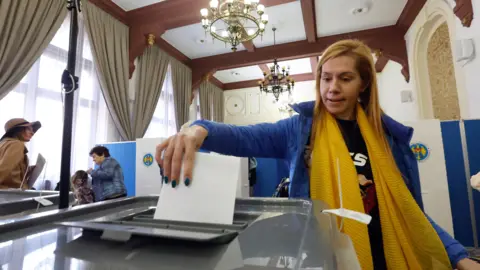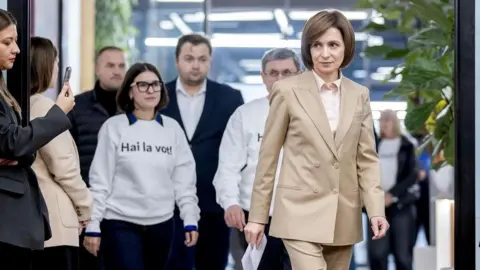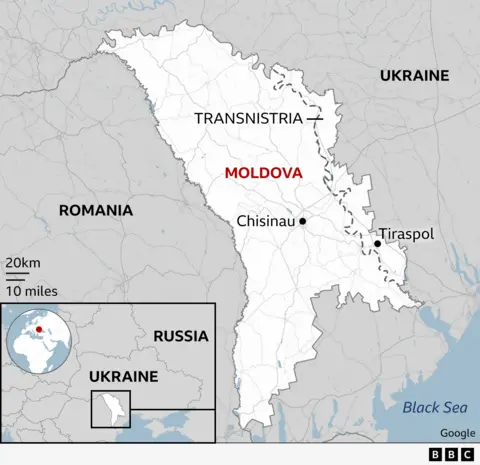 EPA
EPAFolks in Moldova have backed the Jap European nation’s proposed adjustments to its structure and dedication to becoming a member of the EU by the thinnest of margins in a referendum.
Official knowledge put Sure on 50.46% and No on 49.54% on Monday afternoon, with greater than 99.6% of votes counted.
The knife-edge nature of the vote has come as a shock to many. The referendum had been broadly anticipated to comfortably cross within the nation of two.6 million, which borders Romania and Ukraine.
Maia Sandu, the incumbent pro-EU president, mentioned pro-EU forces had received the primary battle in a “troublesome combat”, which she additionally referred to as “unjust”.
She accused these she referred to as Moldova’s “enemies” – and felony teams – of making an attempt to purchase votes and mentioned it was a harmful phenomenon for any democracy.
Earlier on Sunday Sandu had denounced the slim consequence because the product of overseas interference in Moldovan politics and mentioned Moldova had suffered an “unprecedented assault on democracy”.
On neither event did Sandu discuss with Russia explicitly, however in current weeks Modovan authorities uncovered an enormous scheme of funds coming from Moscow – and paid to folks to vote towards Maia Sandu and the EU referendum.
The Kremlin spokesman, Dmitry Peskov, mentioned Sandu would want to current “proof” for her claims that there had been overseas interference within the vote.
He added that the rise within the proportion of votes for Sandu was an “anomaly” that was “troublesome to clarify”.
EU spokesperson Peter Stano mentioned on Monday that the vote had taken place “underneath unprecedented interference and intimidation by Russia and its proxies”.
Final month Ilan Shor, a pro-Russian Moldovan businessman and politician who now lives in Russia, mentioned he would pay cash to persuade “as many individuals as doable” to vote No or to abstain within the EU referendum. This week, Shor then made a video assertion telling folks to vote for “anybody however Sandu” within the presidential election.
On Sunday, the BBC stumbled upon proof of vote-buying at a polling station for residents of the breakaway Moldovan area of Transnistria – which is economically, politically and militarily supported by Russia.
A BBC producer heard a lady who had simply dropped her poll within the clear field ask an election monitor the place she would receives a commission.
After we requested instantly whether or not she had been provided money to vote and she or he admitted it with out qualms. She was offended {that a} man who had despatched her to the polling station was not answering her calls. “He tricked me!” she mentioned.
She wouldn’t reply when requested who she had voted for.
In addition to the referendum on altering the structure, Moldovans additionally voted within the nation’s presidential election on Sunday.
The votes had been seen as key checks for the nation, which is dealing with a selection between pushing on with EU membership or protecting shut ties to Russia.
Sandu topped the election first spherical however by a a lot decrease margin than anticipated – 41% of the vote versus her closest opponent’s 26% – and so will now face a troublesome second spherical in early November wherein her opponents will probably unite towards her.
 EPA
EPAShe accused “felony teams” of working along with “overseas forces” of utilizing cash, lies, and propaganda to sway the vote.
Sandu additionally mentioned her authorities had “clear proof” that 300,000 votes had been purchased, which she referred to as “a fraud of unprecedented scale”.
Moldova is currently in talks with the EU on becoming a member. These accession talks will proceed regardless of Sunday’s end result, because the referendum was not legally binding.
The vote, nonetheless, was speculated to make the method irreversible. As an alternative, it feels a bit of shakier now.
As a result of she did not clinch greater than half of the vote, Sandu and the second frontrunner, Aleksandr Stoianoglo, who’s supported by the pro-Russian Get together of Socialists, will go to a run-off on 3 November.
Stoianoglo received 27%, a consequence that was significantly greater than anticipated.
Populist Renato Usatii got here third, adopted by the previous governor of Gagauzia Irina Vlah.
If the opposite candidates throw their assist behind Stoianoglo forward of the second spherical, Sandu may run the true danger of not being re-elected.
At Sandu’s election headquarters on Sunday night, the temper was extraordinarily subdued, with one in every of her advisers describing the consequence as far as “not what we anticipated”.
Sandu, who has cultivated shut ties with Moldova’s EU neighbours, had campaigned for the Sure vote within the referendum. She had beforehand mentioned the vote was would arrange the way forward for Moldova for “many many years forward”.
When the primary outcomes started trickling in displaying that the No vote had achieved higher than anticipated, Sandu’s workforce put the disappointing outcomes right down to the primary rely coming in from villages and rural areas.
The massive metropolis rely narrowed the lead for the No vote, however by 01:00 (22:00 GMT) few thought the Sure camp may nonetheless stand an opportunity.
A lot of Sandu’s supporters left her headquarters in Chisinau the place they’d been hoping to rejoice her victory earlier than the rely was even over. The little EU flags they’d been given to wave have been deserted, on chairs or strewn on the bottom.
However because the night time went on, the hole narrowed even additional.
In the long run, the Sure vote clinched it – however solely simply.
Voter turnout stood at greater than 51% when polls closed at 21:00 native time (18:00 GMT), making the referendum legitimate.
A number of presidential candidates boycotted the referendum. Aleksandr Stoianoglo mentioned he didn’t assist the thought of adjusting the structure – though he added he was a supporter of his nation’s “European aspirations”.
Nevertheless, many younger folks queuing at polling stations on Sunday had been vocal about their assist for Moldova’s future as an EU member state, with some saying they had been voting as a result of they needed to decide on a European future for his or her nation – for the sake of the financial system and for extra alternatives.
Some mentioned they had been fed up of being “pulled” in direction of Moscow, many years after the Soviet Union collapsed and Moldova grew to become unbiased.

“We’ve got to decide on a European future for our nation, for our youngsters, our future – for geopolitics, for peace, that’s crucial,” a voter referred to as Oksana advised the BBC. “As a result of we’re between Europe and Russian affect, and we’ve to decide on what we wish.”

